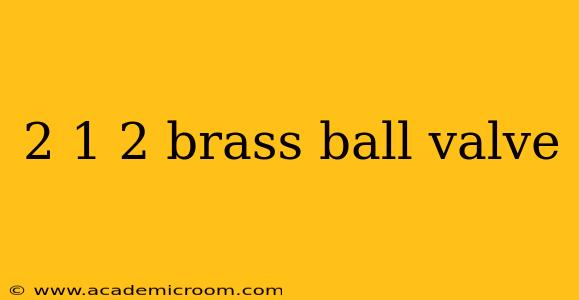Decoding the 2 1/2" Brass Ball Valve: A Comprehensive Guide
Finding the right valve for your plumbing or industrial needs can feel overwhelming. This guide dives deep into the specifics of a 2 1/2" brass ball valve, explaining its features, applications, and considerations for selection. We'll address common questions surrounding this type of valve to ensure you make an informed decision.
What is a 2 1/2" Brass Ball Valve?
A 2 1/2" brass ball valve is a type of valve used to control the flow of fluids (liquids or gases) through a pipe. The "2 1/2"" refers to the nominal pipe size (NPS), indicating the valve's internal diameter. Brass is the material used for construction, offering excellent corrosion resistance and durability. The "ball" refers to the internal spherical component that rotates to either allow or restrict fluid flow. This simple yet effective design makes ball valves popular for various applications.
What are the advantages of using a brass ball valve?
Brass ball valves offer several key advantages:
- Durability: Brass is highly resistant to corrosion, ensuring a long lifespan, especially in applications with water or other corrosive substances.
- Easy Operation: The quarter-turn operation (90-degree rotation) makes them quick and easy to open or close.
- Tight Seal: A well-maintained brass ball valve provides a very tight seal, preventing leaks.
- Cost-Effective: Compared to some other valve types, brass ball valves are relatively inexpensive.
- Wide Range of Applications: They are suitable for a variety of liquids and gases, making them versatile.
What are the typical applications of a 2 1/2" brass ball valve?
Their versatility makes 2 1/2" brass ball valves suitable for a wide array of applications, including:
- Plumbing Systems: Controlling water flow in residential, commercial, and industrial settings.
- Irrigation Systems: Regulating water flow to sprinklers and other irrigation components.
- Industrial Processes: Controlling the flow of various fluids in manufacturing processes.
- Compressed Air Systems: Managing air pressure and flow in pneumatic systems.
- Gas Lines (with appropriate safety considerations): Controlling the flow of gas lines (though always ensure compliance with local regulations and use valves specifically rated for gas).
Important Note: Always verify the valve's pressure rating and material compatibility with the specific fluid being controlled before installation.
How do I choose the right 2 1/2" brass ball valve for my needs?
Selecting the correct 2 1/2" brass ball valve involves considering several factors:
- Pressure Rating: Ensure the valve's pressure rating exceeds the maximum pressure within your system.
- Temperature Rating: The valve must be rated for the temperature range of the fluid.
- End Connections: Choose the correct end connection type (e.g., threaded, flanged, soldered) to match your piping system.
- Flow Control: Some valves offer additional features like flow control capabilities, which may be beneficial depending on your application.
- Material Compatibility: Verify that the brass is compatible with the fluid being controlled; some fluids can react with brass.
How do I maintain a 2 1/2" brass ball valve?
Proper maintenance extends the lifespan of your brass ball valve:
- Regular Inspection: Periodically inspect the valve for leaks, corrosion, or damage.
- Lubrication: Regularly lubricate the valve stem with a suitable lubricant to ensure smooth operation and prevent seizing.
- Cleaning: Clean the valve as needed to remove any debris that may impede operation.
- Replace if Necessary: If the valve shows signs of significant wear or damage, replace it to prevent leaks or malfunctions.
Are there different types of 2 1/2" brass ball valves?
Yes, variations exist, primarily in terms of end connections (threaded, flanged, soldered, etc.) and additional features (e.g., flow control, different handle types). Understanding your specific needs will help determine the most suitable valve.
This guide provides a comprehensive overview of 2 1/2" brass ball valves. Remember to always prioritize safety and consult professional plumbers or engineers for complex installations or applications involving high pressures or hazardous materials.
